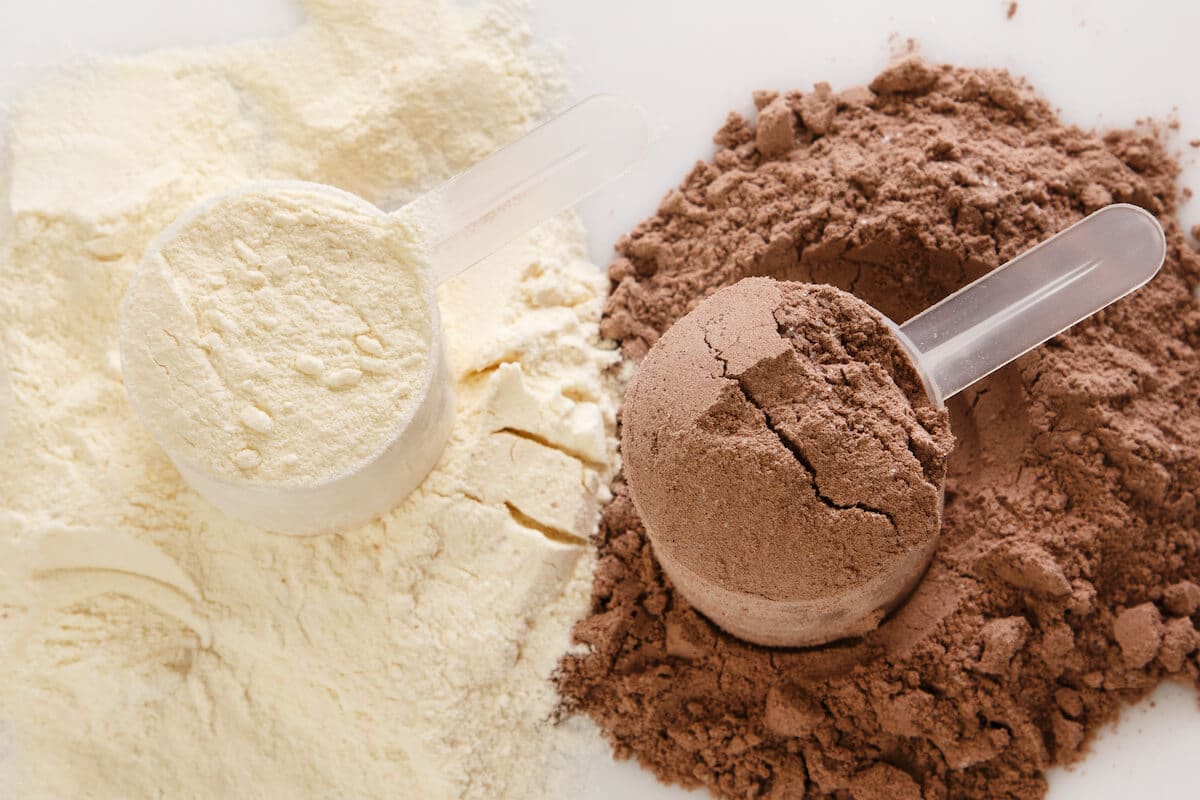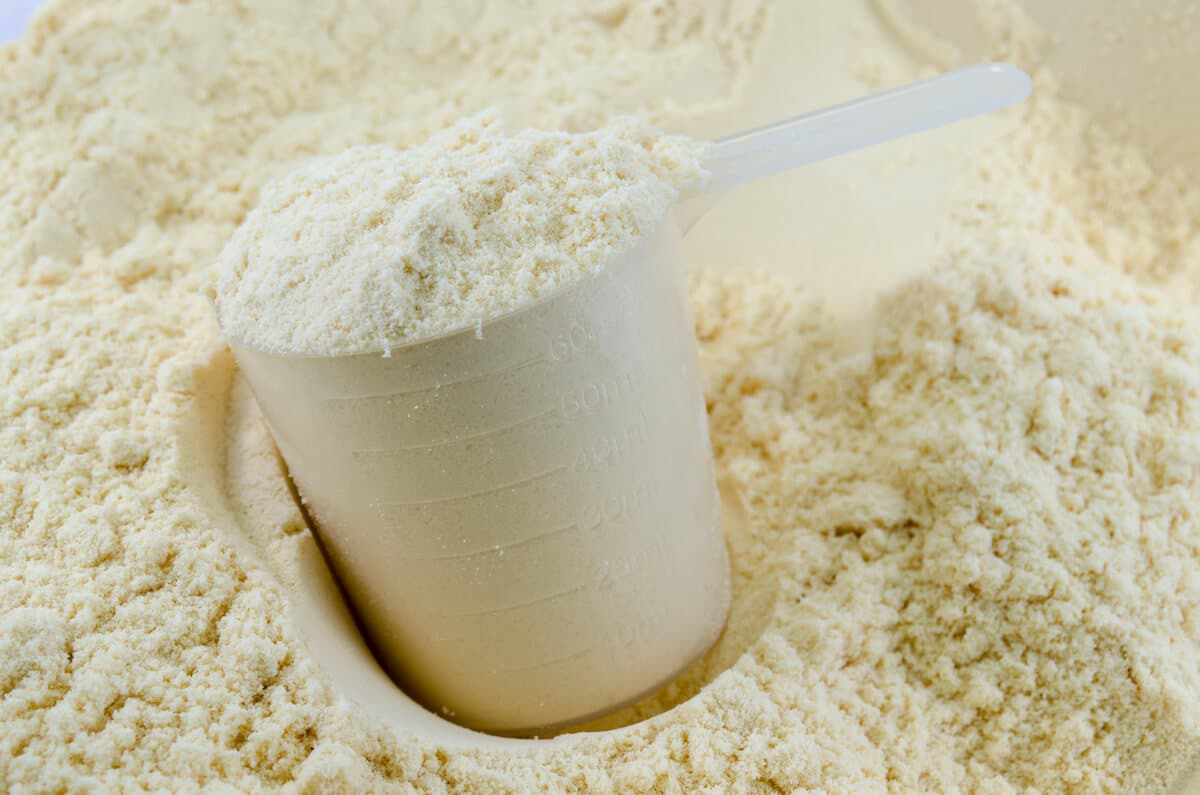
21 Dec Casein vs. Whey: What’s the Difference and Why Does It Matter?
You’ve probably seen casein and whey on the shelves of your local health food store or general retailer. Whether you’re interested in general wellness or specifically building muscle mass, these two products are popular dietary supplements that offer many health benefits. The question is: Casein vs. whey – which is better?
Let’s start by looking at why you need protein in the first place and how it works in your body. Then, we’ll compare the differences and benefits of casein vs. whey so you can make an educated choice when investing in your health and fitness.
Why You Need Protein
Your body needs protein for a range of essential functions. It builds the structure of your cells, bones, muscles, and organs; provides energy to get you through your day (and workouts); and boosts your immune system. For many athletes and bodybuilders, the main focus of protein intake is to build and maintain muscle mass for better performance. However, everybody needs protein, including older adults who lose muscle mass and strength with age.
The anabolic — or muscle building — process relies on getting enough of two elements: protein and resistance exercise. This combination ensures strong muscles and also helps to manage body composition.
Where Does Protein Come From?
You get protein from your diet. More specifically, when you consume protein, your digestive system breaks it down into smaller molecules known as amino acids. These are recombined into new proteins and moved where they are needed in the body.
The most important amino acids are the essential amino acids, so named because the body doesn’t make them. As such, you need to get them from your food intake, whether that’s whole food sources or protein supplements.
Complete proteins — those that contain all the essential amino acids — are ideal when it comes to health and fitness. The most important essential amino acids for muscle protein synthesis are the branched-chain amino acids (BCAAs): leucine, isoleucine, and valine.
While whole foods are a great place to start as protein sources, if you’re exercising intensively, you probably struggle to get enough protein from whole foods alone. Therefore, you need to find other ways to boost your protein intake, which brings us to protein supplements.
As an athlete or bodybuilder, your main goal is to consume more protein on a daily basis than you use doing endurance or resistance training — this way, muscle protein synthesis beats out muscle breakdown.
However, it’s worth noting that your total protein intake each day probably matters more than the type of protein you consumer. That said, different types of protein work slightly differently, so let’s look at casein vs. whey.
What Are Casein and Whey Protein?

Casein and whey are both dairy proteins derived from cow’s milk. These two types of protein were originally byproducts of the cheese-making industry — literally the curds and the whey. They are now manufactured as protein supplements in their own right, with the curds and whey being dried out and turned into protein powder form.
Casein and whey are both complete proteins, giving you the full amino acid profile you need.
Important note: Because both of these supplements are made from milk protein and are therefore essentially dairy products, if you’re lactose intolerant, you might be better off with a high-quality, plant-based protein powder.
Casein vs. Whey: What’s the Difference?
Because of the difference in their structures, casein and whey have different digestion rates and absorption rates.
Whey is digested and absorbed fairly quickly, providing a rapid release of amino acids into your bloodstream. Your amino acid levels are then elevated for about 90 minutes, during which time your body can use these building blocks to build and maintain your muscle tissue and keep up your energy.
In contrast, casein forms curds in your stomach, which take longer to digest and absorb. This creates a steady, slow-release effect, which means the extra amino acids are available in your blood for four to five hours after ingestion of casein.
Because these two types of protein operate so differently in your body, they are each useful for particular functions.
Benefits of Whey vs. Casein
Whey protein powder comes in different forms, including whey protein isolate, whey protein concentrate, and whey protein hydrolysate. Whey protein isolate tends to be highest in protein and lower in carbs, fat, and lactose. As such, it’s probably best for building lean muscle and keeping you fueled during a workout.
Whey is best as a pre-workout or post-workout for several reasons.
As whey rapidly releases amino acids, those amino acids are also quickly available to your body to use during a workout. They boost protein synthesis while protecting your muscles from muscle protein breakdown.
Whey protein also contains higher levels of BCAAs that are so important for muscle building. Leucine is especially important as it triggers the process of muscle protein synthesis.
If you’re on a budget, whey is often more reasonably priced than casein.
Benefits of Casein vs. Whey
Casein protein powder is often best taken at night so your muscles can repair themselves while you sleep.
It doesn’t raise your levels of amino acids quite as high as whey, but it’s slow-digesting, keeping your levels elevated for several hours. This means that muscle protein synthesis can continue while you’re in a fasted state, helping your body recover from intense exercise through the night and maintaining your muscle mass.
Casein is also good to take on non-exercise days when you don’t need that fast boost of energy and you’re not doing high-intensity training that might otherwise result in muscle breakdown.
Choosing the Right Whey or Casein Powder Supplement for You

Deciding on casein vs. whey is just the first step in deciding which protein powder supplement you want to invest in. It’s an important step though, so start by reviewing your health and fitness goals to figure out which one is a better fit for you.
You could also choose to use a blend or buy both individually to use at different times of the day. For example, you might take whey before and/or after your workout and then casein before bed. It’s worth experimenting to see what works best.
Once you’ve made the choice between casein vs. whey, it’s time to sift through the different brands that are available online or in-store. Before you buy, read the ingredient labels and do thorough research to make sure you’re getting the most bang for your buck.
Two high-quality protein supplements with excellent bioavailability:
These products are made with Ingredient Optimized ioWhey Protein, which is proven to be far more bioavailable than non-optimized protein powder.
You can mix it into your protein shake or smoothie, or add it to soups, stews, oats, or pretty much any dish you choose. High-quality protein powder products — especially whey — are usually neutral tasting so they blend right in without affecting the taste.
Casein vs. Whey: Which Is Right for You?
Protein is essential for muscle growth, and casein and whey are both excellent sources of protein. Each gives you the full range of essential amino acids, although in different proportions. The most important differences between them lie in their absorption rates and amino acid profiles.
Whey has more of the muscle-building BCAAs — especially leucine — and is digested and absorbed very fast, giving you quick access to the amino acids you need for energy and muscle protein synthesis during and after a workout. Casein is absorbed much more slowly, giving you sustained access to amino acids over a period of several hours. This can help to build and repair muscle while you sleep, boosting your recovery overnight.
To make your choice between casein vs. whey, start by getting clear on why you need a protein supplement and which type suits your needs. Then, choose a high-quality brand that supports your health and fitness goals to the max.


